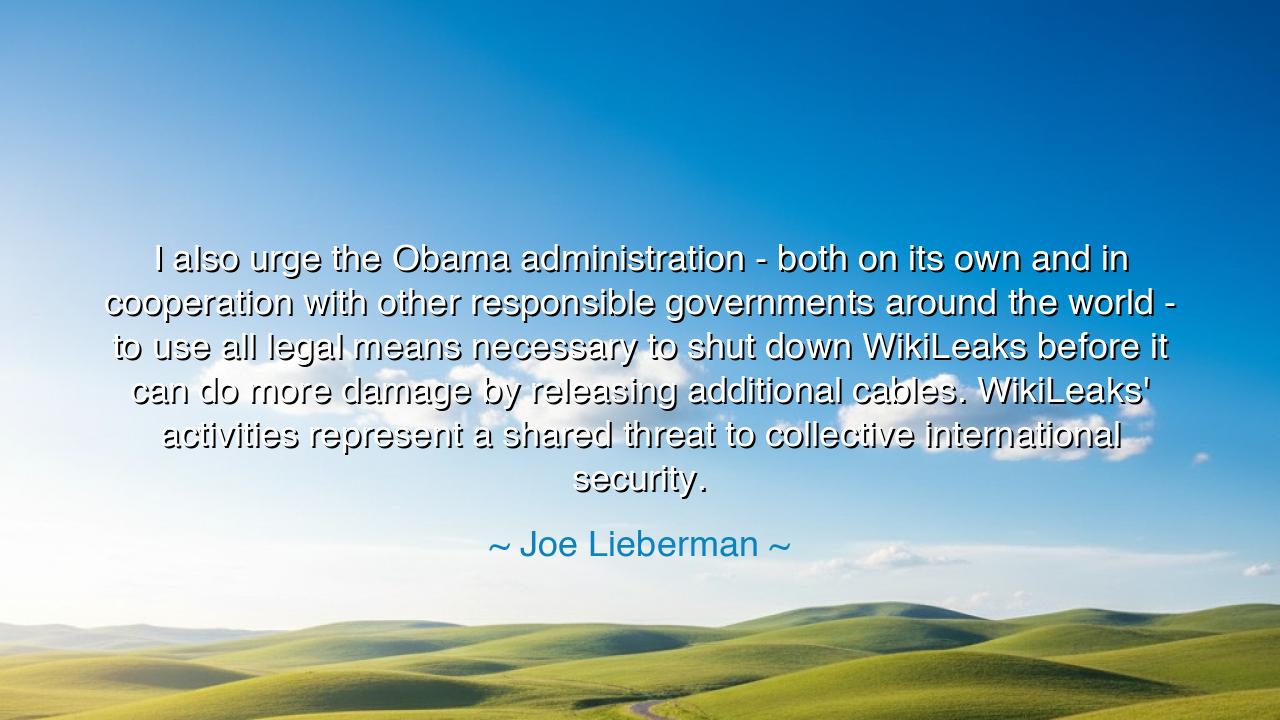
I also urge the Obama administration - both on its own and in
I also urge the Obama administration - both on its own and in cooperation with other responsible governments around the world - to use all legal means necessary to shut down WikiLeaks before it can do more damage by releasing additional cables. WikiLeaks' activities represent a shared threat to collective international security.






When Joe Lieberman declared, “I also urge the Obama administration – both on its own and in cooperation with other responsible governments around the world – to use all legal means necessary to shut down WikiLeaks before it can do more damage by releasing additional cables. WikiLeaks’ activities represent a shared threat to collective international security,” he spoke with the tone of a man who had seen the fragile balance between freedom and order, truth and responsibility, transparency and chaos. His words are born from an age in which the flow of information became both a weapon and a wonder — a force that could enlighten humanity or bring nations to their knees. Beneath his statement lies an ancient dilemma: how far should liberty go before it devours the harmony it seeks to protect?
The origin of this quote rests in the storm that followed the rise of WikiLeaks, the organization that published classified diplomatic cables and government documents for the world to see. To some, it was the torchbearer of truth, a symbol of resistance against secrecy and corruption. But to others, including Lieberman, it was a threat to international stability, a reckless act that endangered lives, alliances, and trust among nations. His call to “use all legal means necessary” was not the cry of tyranny, but the plea of one who believed that even truth, when unleashed without wisdom, could become a weapon of destruction.
In the long history of civilization, this conflict between truth-tellers and protectors has repeated itself like the turning of the seasons. In the days of ancient Athens, Socrates was condemned for revealing truths that unsettled the order of his city; in Rome, Cicero was silenced for exposing the corruption of power. Both men sought to speak freely, yet their words shook the foundations of their societies. Lieberman’s warning stands in this same eternal tension — the recognition that information without restraint can fracture the very world it seeks to heal. The heart that loves liberty must also learn the discipline of guardianship.
For Lieberman, a man forged in the crucible of government, security was not merely defense of territory, but the preservation of trust — the invisible threads that bind nations together. When WikiLeaks released cables revealing diplomatic secrets, he saw not a triumph of knowledge but a rupture in the fabric of diplomacy, where candor between leaders would give way to suspicion, and cooperation would wither under the glare of exposure. He feared that unfiltered revelation would leave societies naked before their enemies, that the unseen shield of confidentiality, which allows nations to speak honestly behind closed doors, would shatter under the weight of idealistic but dangerous transparency.
And yet, there is a paradox in his statement that mirrors the paradox of humanity itself. For even as Lieberman defended secrecy, others argued that secrecy breeds corruption, and that light is the only cure for darkness. Here we see the eternal dance of opposites: truth and order, revelation and restraint. The ancients taught that both extremes lead to ruin — that unrestrained truth can burn like fire, while unyielding secrecy can suffocate like stone. The wise, therefore, must seek balance, where truth is spoken with purpose and protection, and secrecy is used not to hide evil, but to guard peace.
The lesson of Lieberman’s quote is not to silence truth, but to temper it with wisdom. He reminds us that freedom must always be guided by responsibility, and that courage must walk hand in hand with prudence. In an age where information moves faster than reflection, where one revelation can alter the destiny of nations, his warning is both timely and eternal: that power without restraint — even the power of knowledge — can undo the order it was meant to preserve. To act rightly in such times is not to destroy freedom, but to direct it toward harmony.
Let every generation remember this truth: liberty without wisdom is chaos, and secrecy without conscience is tyranny. Between them lies the narrow path of justice — a path walked by those who understand that both light and shadow have their place in the world. Lieberman’s words, though spoken in the language of politics, echo an older wisdom: that civilization survives not through passion alone, but through discernment — through the eternal art of knowing when to speak, and when to guard silence.






AAdministratorAdministrator
Welcome, honored guests. Please leave a comment, we will respond soon